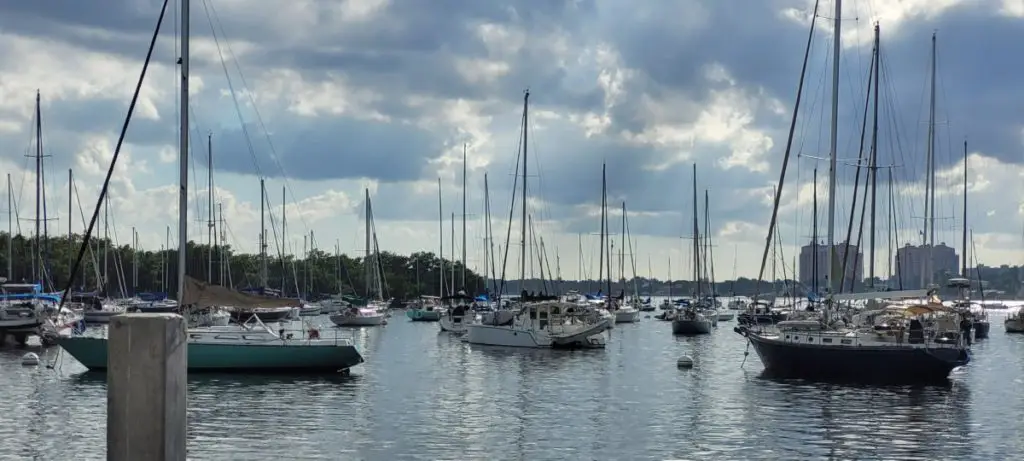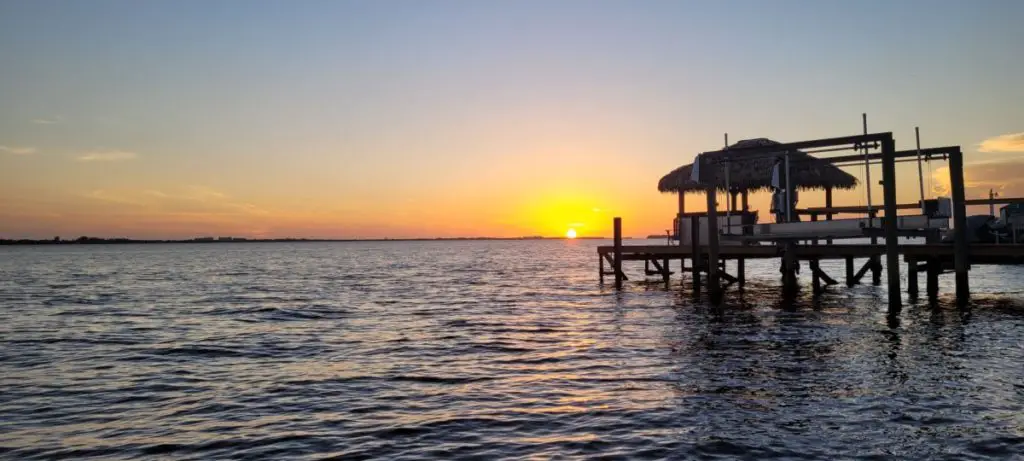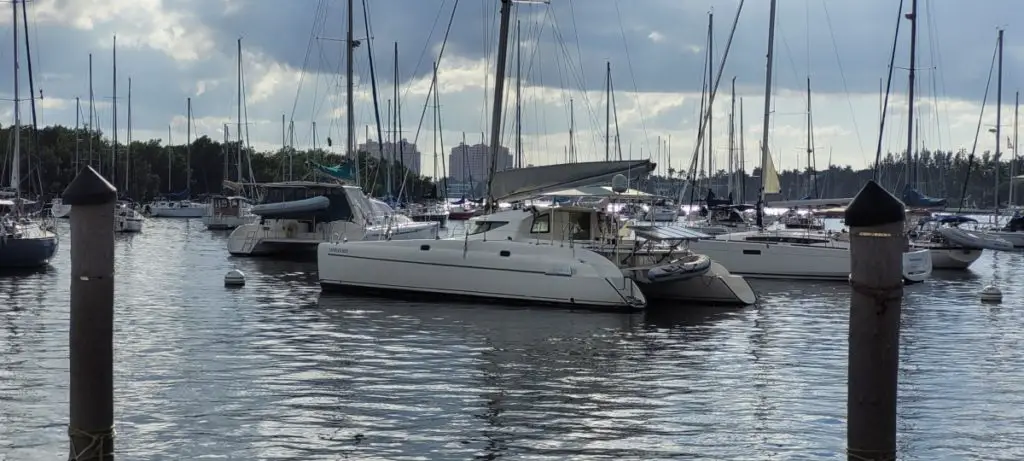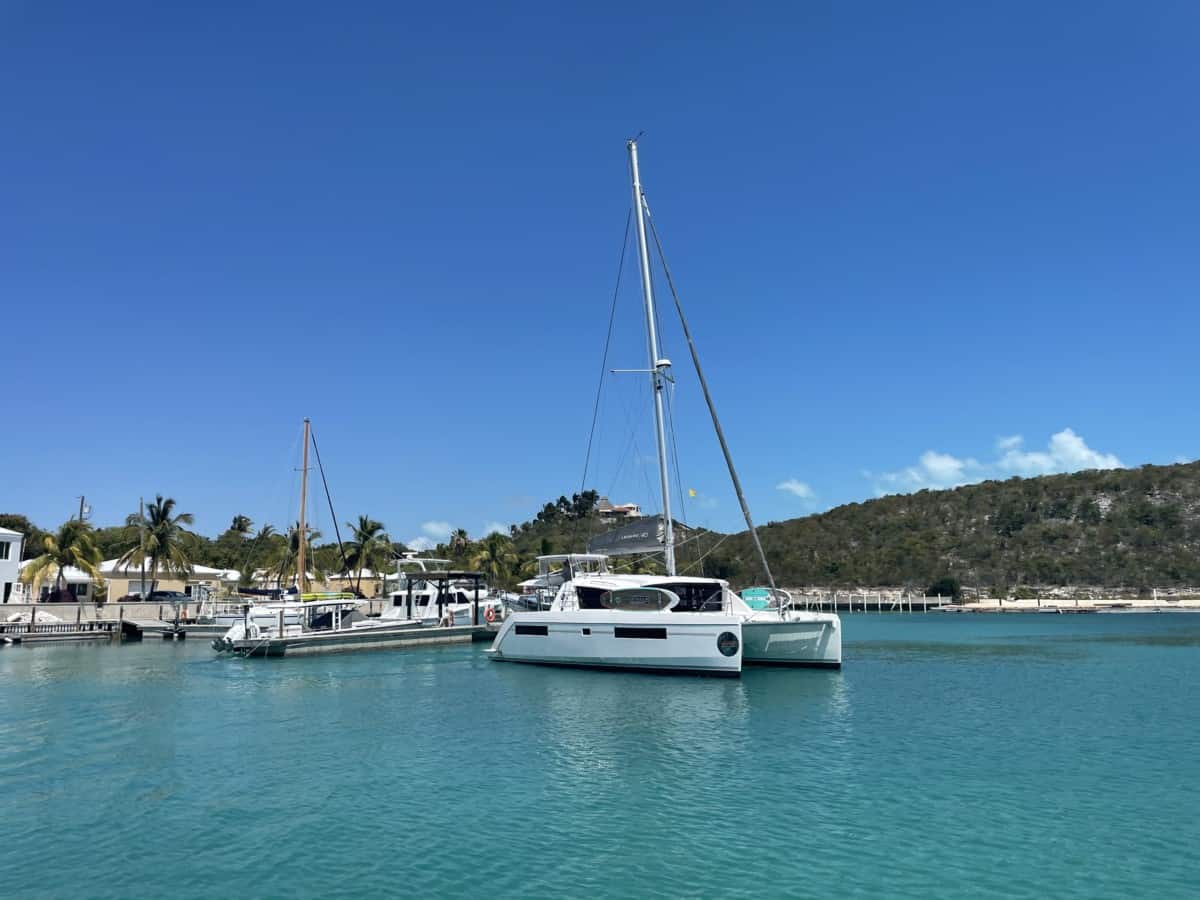As an Amazon Associate, we earn from qualifying purchases. We may also earn commissions if you purchase products from other retailers after clicking on a link from our site.
When we sailed the Bahamas, none of us had any certification, we all survived and had the time of our lives, but a few years later I have revised my thoughts on getting formal education before sailing bigger oceans.
Sailing a catamaran can be a bit challenging when it comes to figuring out the proper licensing you might have to acquire before leaving port. Different states or countries can have contrasting documentation requirements with regard to sailing, so learning when you’ll need a license to operate a catamaran can make the whole process much more straightforward, especially for less experienced sailors.
You need a license to sail a catamaran in specific states when sailing commercially or sometimes when traveling globally. You will also need a bareboat license for chartering. Otherwise, you don’t need a license to operate a catamaran.
In this article, I’ll take you through an in-depth explanation of the situations that require obtaining a sailing license and those that don’t. I’ll also share what the more experienced sailors have to say regarding this topic.

Do You Need a License To Sail a Catamaran?
Whether or not you’re legally required to have a license to sail a catamaran can often depend on many variables, including intent and local or international laws.
You generally do not need a license to sail a catamaran if you’re a recreational sailor. However, if you want to use your sailboat for commercial activities, your local laws require it, or you often travel globally, then you do need to obtain a sailing license.
When it comes to operating a catamaran for recreational activities, chances are you won’t legally be required to obtain a license, which in the US would come from USGC.
Still, this doesn’t mean you can’t seek one out yourself to advance your skills and better familiarize yourself with the practice. Going through a licensing course could help to make you a more capable sailor and remain safer at sea.
While this information will suffice if you don’t plan to take your vessel out of your local borders, regulations can get a little more confusing for those wanting to travel to another state or even internationally. Most of the time, recreational users won’t need a license, even in these cases.
Although you may be visiting a location that, unlike yours, requires licensing to operate a catamaran, these laws usually don’t apply to visitors; therefore, your basic identificational documentation should suffice.
With that said, there can always be some specific states, countries, or waterways that legally require licensing. For this reason, always be sure to research the local laws of the places you’ll be passing through along your trip to avoid any potential legal trouble.

When Do You Need It?
You need a license to sail a catamaran if you use the vessel for commercial purposes, if your local laws require it, or if you tend to travel often globally. The type of license you’ll need to obtain depends on your goals and intentions, as well as the state/country you’re living in.
Firstly, if you’re a commercial sailor, having a sailing license is mandatory. Therefore, before hoisting a sail, seek to obtain a USGC permit, as it is one of the main requirements you need to meet before using the vessel for commercial purposes. I should note that in this case, you’ll also need to be equipped with additional documentation (aside from the USGC license) to use your catamaran legally.
If you’re a recreational sailor, but you often travel globally, you’ll also need to have a license to legally sail the vessel in international waters. Countries and states have different requirements when it comes to documentation, but usually, an ICC or ASA should more than suffice.
Even if sailing laws may sometimes be more forgiving for visitors, you would have to specifically research the regulations of each locality whose waters you’ll be passing through to be entirely sure. Therefore, holding one of these licenses can give you absolute peace of mind and make dealing with logistics much easier.
Having proper documentation can often be necessary even if the specific locality you’re visiting doesn’t require it, as most insurance companies either refuse to insure you without it or give you significantly more expensive rates.
The type of licensing you’ll need to legally sail a catamaran can vary depending on various factors. For most recreational sailors, the OUPV is the most common USCG license. It allows you to operate a vessel carrying up to 100 tons or six passengers.
Here you can find more information on the USGC license that would be the best choice for your specific intentions.
You will also need a certificate or license if you want to charter a boat, usually, this means attending a course like "bareboat charter" with NauticEd (you'll get two free courses with this link)

When Do You Not Need a Sailing Certificate?
You don’t need a license to sail a catamaran if you’re a recreational sailor who doesn’t often travel beyond your local borders. So, if your state’s laws don’t require any documentation and you don’t plan on going on many long-distance trips, you won’t need any certification to operate your vessel.
In most states and countries, you’re not legally required to carry a license when sailing a catamaran. Even if you temporarily travel to a location that does, usually short-term visitors aren’t required to be equipped with any form of documentation.
In short, if you’re a beginner boatman, you’re probably well within your rights to operate your catamaran without a license. With that said, obtaining one can help you immensely improve your skills, especially if you want to take on sailing long-term.
When Does a Sailior Think You Need It?
Many sailors think you need a license (source) to sail a catamaran even when you’re not legally required if you’re a beginner. They put great importance on being qualified to operate a vessel, even when the law doesn’t require it. The road towards getting a certificate will teach you many skills needed to sail safely.
To get a better hold of the subject and what’s the best option for you, you can look through several forums where experienced sailors and seamen discuss the topic. When doing so, you’ll find out that they see licensing as a tool for inexperienced sailors to get a better understanding of the practice and perfect their abilities, not a formality used only to keep themselves out of legal trouble.
Whether or not you are interested in taking sailing classes for reaching a license or just to become a better sailor, in this article I have compared ASA vs. US Sailing and why I chose neither of them.
Conclusion
Although most recreational sailors don’t have to have a license to operate a catamaran, there are specific circumstances in which having this piece of documentation is required, so always check your local laws and regulations to decide on what’s the best choice for you.
Here are Some of My Favorite Catamaran Cruising Resources
Thank you for reading this article. I hope you found it helpful as you hopefully start your sailing adventures. Here are some resources that I use as a sailor that I hope you’ll also find helpful. These are affiliate links, so if you do decide to use any of them, I’ll earn a commission. But in all honesty, these are the exact things that I use and recommend to everyone, even my own family.
Sailboats: If you’re looking for the best boat to suit your needs, I would recommend a catamaran. If you’re interested, I can show you the differences between catamarans and other types of sailboats.
Books: For getting started, I really like Cruising catamarans made easy. It is actually a textbook from the American sailing association; it is used to get a cruising catamaran certification. There are some other great books, and I have compiled a list of books about cruising catamarans that you will find useful.
Communication: Being out on adventures, whether it be sailing or climbing mountains, good communications are essential to being safe. I recommend two things Google fi (incredibly simple cellular data all over the world) and Garmin inreach mini (for text and voice in remote areas without cell coverage)
Sailing courses: Online sailing courses are great for beginners starting out their sailing career; it’s an efficient way of learning the basics of navigation, throttle controls, and maritime safety. I suggest starting with two free courses from NauticEd.
To see all my most up-to-date recommendations, check out this resource that I made for you!


